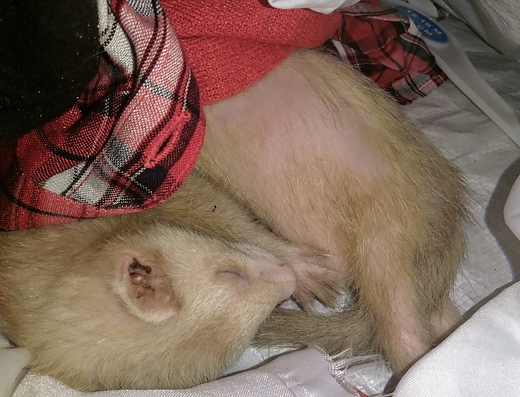Adrenal Disease In Ferrets
Dr. Abdul Basit Javed (DVM, RVMP)
Ferrets are adorable little creatures, and the trend of keeping ferrets as pets are on the rise. Ferrets have very different needs compared to other pets and can suffer from a variety of diseases. One such disease is an adrenal disease, also known as an adrenocortical disease.
Adrenal glands are two tiny glands present alongside each kidney in ferrets. Normally, these glands release hormones that are needed for a variety of functions in the ferret’s body; however, in adrenal disease or adrenocortical disease, these glands become hyperactive and release an abundance of hormones, causing health problems in the ferrets.
If you own a ferret, you should be aware of adrenal disease/adrenocortical disease, as it is one of the top three diseases affecting ferrets and can be fatal if not treated. Read on for a comprehensive guide prepared by a small animal veterinarian about the adrenal disease in ferrets, including symptoms, causes, treatments, and prevention.
Adrenal Disease In Ferrets
Adrenal disease, also known as adrenocortical disease, affects the adrenal glands in ferrets. These glands are located on the anterior side of each kidney and are an important part of the ferret’s endocrine system.
In a healthy ferret, the adrenal glands release several hormones including cortisol, sex hormones, adrenaline, and others. In ferrets with adrenal disease, the portion of the adrenal glands responsible for releasing sex hormones becomes hyperactive and releases hormones in abundance, more than what is needed.
“Adrenal disease/Adrenocortical disease is one of the top three worst diseases that affects ferrets, and every ferret owner must have basic knowledge about this disease,” says Dr. Miranda Sadar, an assistant professor of zoological, exotic, and wildlife medicine at the Western College of Veterinary Medicine (WCVM).
Adrenal disease is so common in ferrets that a 2003 survey discovered that 70% of ferrets in the United States have it, and it is often fatal if left untreated.
Middle-aged ferrets (between 3-5 years old) are typically affected by this disease. This disease can affect both male and female ferrets, though symptoms may differ depending on gender.

Causes Of Adrenal Disease In Ferrets
This disease is primarily caused by various types of tumors and changes in the ferret’s adrenal glands. The exact cause of these tumors and changes is unknown, but the following factors are thought to be responsible:
- Diet (Unhealthy diet contaminated with additives, preservatives, chemicals, etc can certainly increase the risk of tumors and cancer in ferrets)
- Exposure to sunlight (Ferrets are seasonal breeders, and changes in daylight affect hormone release in their bodies)
- Early neutering or spaying (When ferrets are spayed or neutered at a young age, a melatonin-negative feedback mechanism in their bodies is disrupted, increasing the release of sex hormones).
Symptoms Of Adrenal Disease In Ferrets

Adrenal disease symptoms in ferrets vary depending on the severity and overall health of the ferret, but some common symptoms include the following:
- Hair loss (Occurs in approximately 80% of ferrets with the disease and can be seasonal, but if untreated, can progress to complete baldness. Hair loss is most common on the tail, hind limbs, and rump)
- Swollen vulva (In female ferrets, even if spayed, due to hormonal disturbances)
- Enlarged prostate (In male ferrets due to hormonal imbalances. This can also cause urination problems and discomfort. Most male ferrets with enlarged prostates will repeatedly go into their litter box but will not urinate and may urinate outside the litter box.)
- Behavioral changes (Such as increased aggression, males will often be more aggressive towards females)
- Muscle atrophy
- Pruritus (Itchiness)
- Lethargy
- Anemia (In female ferrets due to estrogen toxicity)
Diagnosis Of Adrenal Disease In Ferrets
A veterinarian can diagnose adrenal disease in ferrets with the help of the following:
- Based on signs and symptoms
- Physical examination
- Ultrasound
- Bloodwork
How To Treat Adrenal Disease In Ferrets

Fortunately, adrenal disease in ferrets can be permanently treated as well as can be managed with the help of medications:
Medication
Remember that medications do not cure adrenal disease in ferrets; they can only help manage it by reducing symptoms and should be given regularly to keep the disease under control. The adrenal disease usually returns if medications are not administered.
Medication therapy is usually only recommended for ferrets who are not good surgical candidates due to old age or poor health. Among the medications used to treat ferret adrenal disease are the following:
Deslorelin:
This medication mimics GnRH’s effects and prevents adrenal stimulation. This drug is similar to Lupron, but its advantage is that its implant can last for up to 2 years in the ferret’s body, and it has also been beneficial in reducing the size and growth of adrenal tumors in some ferrets. It is also preferred over Lupron because it is more readily available and less costly.
Melatonin:
Melatonin is injected as a rice grain-sized implant in the loose skin between the ferrets’ shoulder blades. Melatonin inhibits GnRH, lowering the concentration of LH and FSH hormones and thus preventing adrenal stimulation. Once the implant has been absorbed, a new one must be administered.
Lupron:
Lupron, like Deslorelin, mimics the GnRH hormone and reduces the release of sex hormones from the adrenal glands. Lupron alleviates the symptoms of ferret adrenal disease but does not affect tumor size.
Surgery
The surgical removal of the adrenal glands is the only permanent treatment for ferrets with adrenal disease. The surgical approach includes inspecting both adrenal glands.
In general, only the left adrenal gland is removed since it is easily accessible and because removing both glands can result in complications for the ferret such as hypoadrenocorticism.
The right adrenal gland is usually not removed because it lies near major blood vessels and organs such as the liver. Adrenal disease in ferrets is usually completely cured, but there is a small chance that the adrenal mass will regrow.
Can Ferrets With The Adrenal Disease Live A Normal Life
Adrenal disease in ferrets is fatal if not treated. The chances of survival are especially low if the ferret has developed serious complications such as the inability to urinate, cancer, or large tumor growth.
However, if the ferret suffering from adrenal disease receives proper medical care early on, it can live a normal life and may survive for years. Prognosis is also good with the right treatment at the right time.
How To Prevent Adrenal Disease In Ferrets
For many years, there was no way to prevent adrenal disease in ferrets. However, new research shows that administering Lupron injections to ferrets once a year during their breeding season can prevent and delay the onset of adrenal disease. Lupron injections are only given if the ferret has not had a deslorelin implant in the previous 18 months. Male ferrets should be given Lupron in January, while female ferrets should be given Lupron in mid-February to mid-March.

Check out our Amazon store for cool and fun clothes to keep you and your ferret stylish








